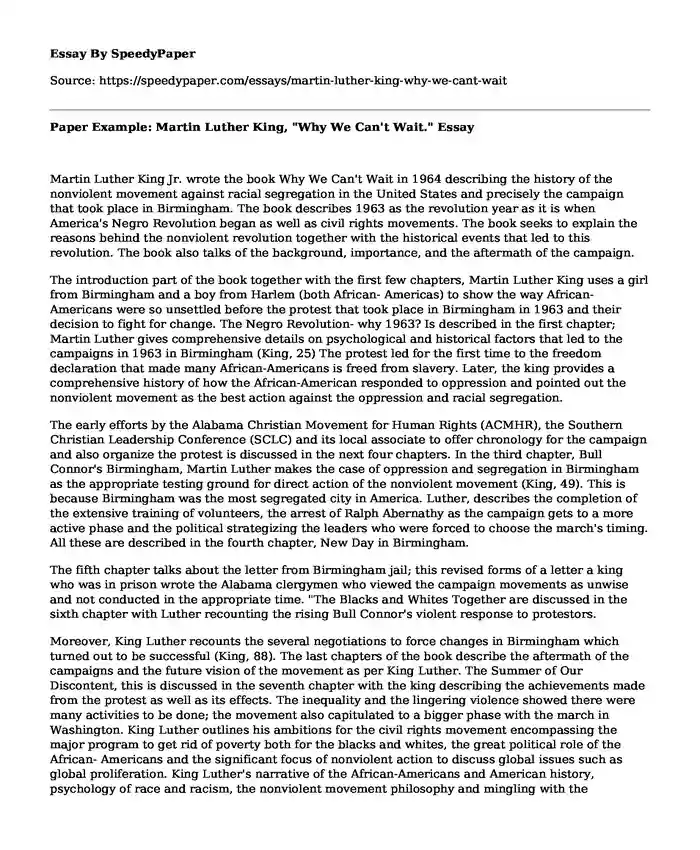
| Type of paper: | Presentation |
| Categories: | Martin Luther King Civil rights Books |
| Pages: | 3 |
| Wordcount: | 615 words |
Martin Luther King Jr. wrote the book Why We Can't Wait in 1964 describing the history of the nonviolent movement against racial segregation in the United States and precisely the campaign that took place in Birmingham. The book describes 1963 as the revolution year as it is when America's Negro Revolution began as well as civil rights movements. The book seeks to explain the reasons behind the nonviolent revolution together with the historical events that led to this revolution. The book also talks of the background, importance, and the aftermath of the campaign.
The introduction part of the book together with the first few chapters, Martin Luther King uses a girl from Birmingham and a boy from Harlem (both African- Americas) to show the way African-Americans were so unsettled before the protest that took place in Birmingham in 1963 and their decision to fight for change. The Negro Revolution- why 1963? Is described in the first chapter; Martin Luther gives comprehensive details on psychological and historical factors that led to the campaigns in 1963 in Birmingham (King, 25) The protest led for the first time to the freedom declaration that made many African-Americans is freed from slavery. Later, the king provides a comprehensive history of how the African-American responded to oppression and pointed out the nonviolent movement as the best action against the oppression and racial segregation.
The early efforts by the Alabama Christian Movement for Human Rights (ACMHR), the Southern Christian Leadership Conference (SCLC) and its local associate to offer chronology for the campaign and also organize the protest is discussed in the next four chapters. In the third chapter, Bull Connor's Birmingham, Martin Luther makes the case of oppression and segregation in Birmingham as the appropriate testing ground for direct action of the nonviolent movement (King, 49). This is because Birmingham was the most segregated city in America. Luther, describes the completion of the extensive training of volunteers, the arrest of Ralph Abernathy as the campaign gets to a more active phase and the political strategizing the leaders who were forced to choose the march's timing. All these are described in the fourth chapter, New Day in Birmingham.
The fifth chapter talks about the letter from Birmingham jail; this revised forms of a letter a king who was in prison wrote the Alabama clergymen who viewed the campaign movements as unwise and not conducted in the appropriate time. "The Blacks and Whites Together are discussed in the sixth chapter with Luther recounting the rising Bull Connor's violent response to protestors.
Moreover, King Luther recounts the several negotiations to force changes in Birmingham which turned out to be successful (King, 88). The last chapters of the book describe the aftermath of the campaigns and the future vision of the movement as per King Luther. The Summer of Our Discontent, this is discussed in the seventh chapter with the king describing the achievements made from the protest as well as its effects. The inequality and the lingering violence showed there were many activities to be done; the movement also capitulated to a bigger phase with the march in Washington. King Luther outlines his ambitions for the civil rights movement encompassing the major program to get rid of poverty both for the blacks and whites, the great political role of the African- Americans and the significant focus of nonviolent action to discuss global issues such as global proliferation. King Luther's narrative of the African-Americans and American history, psychology of race and racism, the nonviolent movement philosophy and mingling with the chronology of the Birmingham protests allows him to make a case in civil right movement.
Works Cited
Johnson, Davi. "Martin Luther King Jr.'s 1963 Birmingham campaign as image event." Rhetoric & Public Affairs 10.1 (2007): 1-25.
Cite this page
Paper Example: Martin Luther King, "Why We Can't Wait.". (2023, Feb 08). Retrieved from https://speedypaper.net/essays/martin-luther-king-why-we-cant-wait
Request Removal
If you are the original author of this essay and no longer wish to have it published on the SpeedyPaper website, please click below to request its removal:
- Essay Example on Enterprise Risk Management at Wells Fargo
- Episodic vs Structural Violence, Essay Example
- Free Essay on Professional Development for Teachers
- Art Essay Example
- Essay Sample on Unethical Behaviors in Forensic Science
- Free Essay: Reformational View of Vocation
- Essay Sample on Starbucks' Organizational Setting
Popular categories




